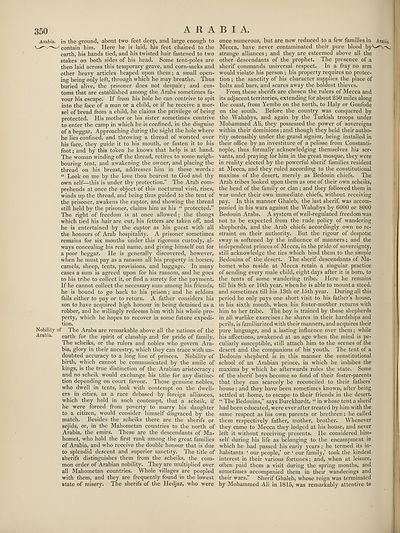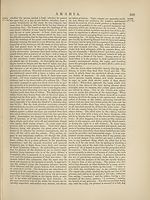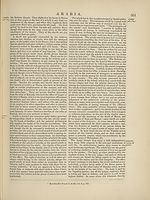Encyclopaedia Britannica > Volume 3, Anatomy-Astronomy
(358) Page 350
Download files
Complete book:
Individual page:
Thumbnail gallery: Grid view | List view

350 A R A
Arabia, in the ground, about two feet deep, and large enough to
contain him. Here he is laid, his feet chained to the
earth, his hands tied, and his twisted hair fastened to two
stakes on both sides of his head. Some tent-poles are
then laid across this temporary grave, and corn-sacks and
other heavy articles heaped upon them; a small open¬
ing being only left, through which he may breathe. Thus
buried alive, the prisoner does not despair; and cus¬
toms that are established among the Arabs sometimes fa¬
vour his escape. If from his hole he can contrive to spit
into the face of a man or a child, or if he receive a mor¬
sel of bread from a child, he claims the privilege of being
protected. His mother or his sister sometimes contrive
to enter the camp in which he is confined, in the disguise
of a beggar. Approaching during the night the hole where
he lies confined, and throwing a thread of worsted over
his face, they guide it to his mouth, or fasten it to his
foot; and by this token he knows that help is at hand.
The woman winding off the thread, retires to some neigh¬
bouring tent, and awakening the owner, and placing the
thread on his breast, addresses him in these words:
“ Look on me by the love thou bearest to God and thy
own self—this is under thy protection.” The Arab com¬
prehends at once the object of this nocturnal visit, rises,
winds up the thread, and being thus guided to the tent of
the prisoner, awakens the captor, and showing the thread
still held by the prisoner, claims him as his “ protected.”
The right of freedom is at once allowed; the thongs
which tied his hair are cut, his fetters are taken off, and
he is entertained by the captor as his guest with all
the honours of Arab hospitality. A prisoner sometimes
remains for six months under this rigorous custody, al¬
ways concealing his real name, and giving himself out for
a poor beggar. He is generally discovered, however,
when he must pay as a ransom all his property in horses,
camels, sheep, tents, provisions, and baggage. In many
cases a sum is agreed upon for his ransom, and he goes
to his tribe to collect it, or find a surety for the payment.
If he cannot collect the necessary sum among his friends,
he is bound to go back to his prison; and he seldom
fails either to pay or to return. A father considers his
son to have acquired high honour in being detained as a
robber, and he willingly redeems him with his whole pro¬
perty, which he hopes to recover in some future expedi¬
tion.
Nobility of The Arabs are remarkable above all the nations of the
Arabia. earth for the spirit of clanship and for pride of family.
The scheiks, or the rulers and nobles who govern Ara¬
bia, glory in their ancestry, which they can trace with un¬
doubted accuracy to a long line of princes. Nobility of
birth, which cannot be communicated by the smile of
kings, is the true distinction of the Arabian aristocracy;
and no scheik would exchange his title for any distinc¬
tion depending on court favour. Those genuine nobles,
who dwell in tents, look with contempt on the dwell¬
ers in cities, as a race debased by foreign alliances,
which they hold in such contempt, that a scheik, if
he were forced from poverty to marry his daughter
to a citizen, would consider himself disgraced by the
match. Besides the scheiks there are the sherifs or
sejids, or, in the Mahometan countries to the north of
Arabia, the emirs. These are the descendants of Ma¬
homet, who hold the first rank among the great families
of Arabia, and who receive the double honour that is due
to splendid descent and superior sanctity. The title of
sherifs distinguishes them from the scheiks, the com¬
mon order of Arabian nobility. They are multiplied over
all Mahometan countries. Whole villages are peopled
with them, and they are frequently found in the lowest
state of misery. The sherifs of the Hedjaz, who were
B I A.
once numerous, but are now reduced to a few families in Arabia,
Mecca, have never contaminated their pure blood by''-*~\~v.
strange alliances; and they are esteemed above all the
other descendants of the prophet. The presence of a
sherif commands universal respect. In a fray no arm
would violate his person ; his property requires no protec¬
tion ; the sanctity of his character supplies the place of
bolts and bars, and scares away the boldest thieves.
From these sherifs are chosen the rulers of Mecca and
its adjacent territories, extending for about 250 miles along
the coast, from Yembo on the north, to Haly or Gonfode
on the south. Before the country was conquered by
the Wahabys, and again by the Turkish troops under
Mohammed Ali, they possessed the power of sovereigns
within their dominions ; and though they held their autho¬
rity ostensibly under the grand signior, being installed in
their office by an investiture of a pelisse from Constanti¬
nople, thus formally acknowledging themselves his ser¬
vants, and praying for him in the great mosque, they were
in reality elected by the powerful sherif families resident
at Mecca, and they ruled according to the constitutional
maxims of the desert, merely as Bedouin chiefs. The
Arab tribes looked upon them as one of their own scheiks,
the head of the family or clan ; and they followed them in
war under their own immediate chiefs, without receiving
pay. In this manner Ghaleb, the last sherif, was accom¬
panied in his wars against the Wahabys by 6000 or 8000
Bedouin Arabs. A system of well-regulated freedom was
not to be expected from the rude policy of wandering
shepherds, and the Arab chiefs accordingly own no re¬
straint on their authority. But the rigour of despotic
sway is softened by the influence of manners; and the
independent princes of Mecca, in the pride of sovereignty,
still acknowledge the ties which bind them to the simple
Bedouins of the desert. The sherif descendants of Ma¬
homet who reside at Mecca retain a singular practice
of sending every male child, eight days after it is born, to
the tents of some wandering tribe. Here he remains
till his 8th or 10th year, when he is able to mount a steed,
and sometimes till his 13th or 15th year. During all this
period he only pays one short visit to his father’s house,
in his sixth month, when his foster-mother returns with
him to her tribe. The boy is trained by those shepherds
in all warlike exercises: he shares in their hardships and
perils, is familiarized with their manners, and acquires their
pure language, and a lasting influence over them; while
his affections, awakened at an age when the mind is pe¬
culiarly susceptible, still attach him to the scenes of the
desert and the companions of his youth. The tent of a
Bedouin shepherd is in this manner the constitutional
school of an Arabian prince, in which he imbibes the
maxims by which he afterwards rules the state. Some
of the sherif boys become so fond of their foster-parents
that they can scarcely be reconciled to their fathers’
house; and they have been sometimes known, after being
settled at home, to escape to their friends in the desert.
“ The Bedouins,” says Burckhardt, “ in whose tent a sherif
had been educated, were ever after treated by him with the
same respect as his own parents or brethren: he called
them respectively father, mother, brother. Whenever
they came to Mecca they lodged at his house, and never
left it without receiving presents. He considered him¬
self during his life as belonging to the encampment in
which he had passed his early years; he termed its in¬
habitants ‘ our people,’ or ‘ our family,’ took the kindest
interest in their various fortunes; and, when at leisure,
often paid them a visit during the spring months, and
sometimes accompanied them in their wanderings and
their wars.” Sherif Ghaleb, whose reign was terminated
by Mohammed Ali in 1815, was remarkably attentive to
Arabia, in the ground, about two feet deep, and large enough to
contain him. Here he is laid, his feet chained to the
earth, his hands tied, and his twisted hair fastened to two
stakes on both sides of his head. Some tent-poles are
then laid across this temporary grave, and corn-sacks and
other heavy articles heaped upon them; a small open¬
ing being only left, through which he may breathe. Thus
buried alive, the prisoner does not despair; and cus¬
toms that are established among the Arabs sometimes fa¬
vour his escape. If from his hole he can contrive to spit
into the face of a man or a child, or if he receive a mor¬
sel of bread from a child, he claims the privilege of being
protected. His mother or his sister sometimes contrive
to enter the camp in which he is confined, in the disguise
of a beggar. Approaching during the night the hole where
he lies confined, and throwing a thread of worsted over
his face, they guide it to his mouth, or fasten it to his
foot; and by this token he knows that help is at hand.
The woman winding off the thread, retires to some neigh¬
bouring tent, and awakening the owner, and placing the
thread on his breast, addresses him in these words:
“ Look on me by the love thou bearest to God and thy
own self—this is under thy protection.” The Arab com¬
prehends at once the object of this nocturnal visit, rises,
winds up the thread, and being thus guided to the tent of
the prisoner, awakens the captor, and showing the thread
still held by the prisoner, claims him as his “ protected.”
The right of freedom is at once allowed; the thongs
which tied his hair are cut, his fetters are taken off, and
he is entertained by the captor as his guest with all
the honours of Arab hospitality. A prisoner sometimes
remains for six months under this rigorous custody, al¬
ways concealing his real name, and giving himself out for
a poor beggar. He is generally discovered, however,
when he must pay as a ransom all his property in horses,
camels, sheep, tents, provisions, and baggage. In many
cases a sum is agreed upon for his ransom, and he goes
to his tribe to collect it, or find a surety for the payment.
If he cannot collect the necessary sum among his friends,
he is bound to go back to his prison; and he seldom
fails either to pay or to return. A father considers his
son to have acquired high honour in being detained as a
robber, and he willingly redeems him with his whole pro¬
perty, which he hopes to recover in some future expedi¬
tion.
Nobility of The Arabs are remarkable above all the nations of the
Arabia. earth for the spirit of clanship and for pride of family.
The scheiks, or the rulers and nobles who govern Ara¬
bia, glory in their ancestry, which they can trace with un¬
doubted accuracy to a long line of princes. Nobility of
birth, which cannot be communicated by the smile of
kings, is the true distinction of the Arabian aristocracy;
and no scheik would exchange his title for any distinc¬
tion depending on court favour. Those genuine nobles,
who dwell in tents, look with contempt on the dwell¬
ers in cities, as a race debased by foreign alliances,
which they hold in such contempt, that a scheik, if
he were forced from poverty to marry his daughter
to a citizen, would consider himself disgraced by the
match. Besides the scheiks there are the sherifs or
sejids, or, in the Mahometan countries to the north of
Arabia, the emirs. These are the descendants of Ma¬
homet, who hold the first rank among the great families
of Arabia, and who receive the double honour that is due
to splendid descent and superior sanctity. The title of
sherifs distinguishes them from the scheiks, the com¬
mon order of Arabian nobility. They are multiplied over
all Mahometan countries. Whole villages are peopled
with them, and they are frequently found in the lowest
state of misery. The sherifs of the Hedjaz, who were
B I A.
once numerous, but are now reduced to a few families in Arabia,
Mecca, have never contaminated their pure blood by''-*~\~v.
strange alliances; and they are esteemed above all the
other descendants of the prophet. The presence of a
sherif commands universal respect. In a fray no arm
would violate his person ; his property requires no protec¬
tion ; the sanctity of his character supplies the place of
bolts and bars, and scares away the boldest thieves.
From these sherifs are chosen the rulers of Mecca and
its adjacent territories, extending for about 250 miles along
the coast, from Yembo on the north, to Haly or Gonfode
on the south. Before the country was conquered by
the Wahabys, and again by the Turkish troops under
Mohammed Ali, they possessed the power of sovereigns
within their dominions ; and though they held their autho¬
rity ostensibly under the grand signior, being installed in
their office by an investiture of a pelisse from Constanti¬
nople, thus formally acknowledging themselves his ser¬
vants, and praying for him in the great mosque, they were
in reality elected by the powerful sherif families resident
at Mecca, and they ruled according to the constitutional
maxims of the desert, merely as Bedouin chiefs. The
Arab tribes looked upon them as one of their own scheiks,
the head of the family or clan ; and they followed them in
war under their own immediate chiefs, without receiving
pay. In this manner Ghaleb, the last sherif, was accom¬
panied in his wars against the Wahabys by 6000 or 8000
Bedouin Arabs. A system of well-regulated freedom was
not to be expected from the rude policy of wandering
shepherds, and the Arab chiefs accordingly own no re¬
straint on their authority. But the rigour of despotic
sway is softened by the influence of manners; and the
independent princes of Mecca, in the pride of sovereignty,
still acknowledge the ties which bind them to the simple
Bedouins of the desert. The sherif descendants of Ma¬
homet who reside at Mecca retain a singular practice
of sending every male child, eight days after it is born, to
the tents of some wandering tribe. Here he remains
till his 8th or 10th year, when he is able to mount a steed,
and sometimes till his 13th or 15th year. During all this
period he only pays one short visit to his father’s house,
in his sixth month, when his foster-mother returns with
him to her tribe. The boy is trained by those shepherds
in all warlike exercises: he shares in their hardships and
perils, is familiarized with their manners, and acquires their
pure language, and a lasting influence over them; while
his affections, awakened at an age when the mind is pe¬
culiarly susceptible, still attach him to the scenes of the
desert and the companions of his youth. The tent of a
Bedouin shepherd is in this manner the constitutional
school of an Arabian prince, in which he imbibes the
maxims by which he afterwards rules the state. Some
of the sherif boys become so fond of their foster-parents
that they can scarcely be reconciled to their fathers’
house; and they have been sometimes known, after being
settled at home, to escape to their friends in the desert.
“ The Bedouins,” says Burckhardt, “ in whose tent a sherif
had been educated, were ever after treated by him with the
same respect as his own parents or brethren: he called
them respectively father, mother, brother. Whenever
they came to Mecca they lodged at his house, and never
left it without receiving presents. He considered him¬
self during his life as belonging to the encampment in
which he had passed his early years; he termed its in¬
habitants ‘ our people,’ or ‘ our family,’ took the kindest
interest in their various fortunes; and, when at leisure,
often paid them a visit during the spring months, and
sometimes accompanied them in their wanderings and
their wars.” Sherif Ghaleb, whose reign was terminated
by Mohammed Ali in 1815, was remarkably attentive to
Set display mode to:
![]() Universal Viewer |
Universal Viewer | ![]() Mirador |
Large image | Transcription
Mirador |
Large image | Transcription
Images and transcriptions on this page, including medium image downloads, may be used under the Creative Commons Attribution 4.0 International Licence unless otherwise stated. ![]()
| Encyclopaedia Britannica > Encyclopaedia Britannica > Volume 3, Anatomy-Astronomy > (358) Page 350 |
|---|
| Permanent URL | https://digital.nls.uk/193762002 |
|---|
| Attribution and copyright: |
|
|---|---|
| Shelfmark | EB.16 |
|---|---|
| Description | Ten editions of 'Encyclopaedia Britannica', issued from 1768-1903, in 231 volumes. Originally issued in 100 weekly parts (3 volumes) between 1768 and 1771 by publishers: Colin Macfarquhar and Andrew Bell (Edinburgh); editor: William Smellie: engraver: Andrew Bell. Expanded editions in the 19th century featured more volumes and contributions from leading experts in their fields. Managed and published in Edinburgh up to the 9th edition (25 volumes, from 1875-1889); the 10th edition (1902-1903) re-issued the 9th edition, with 11 supplementary volumes. |
|---|---|
| Additional NLS resources: |
|

